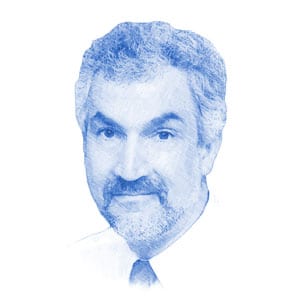As Recep Tayyip Erdoğan ascends today to the presidency of Turkey, his hand-picked successor, Ahmet Davutoğlu, simultaneously assumes Erdoğan’s old job of prime minister. What do these changes portend for Turkey and its foreign policy? In two words: nothing good.
In June 2005, when Davutoğlu served as chief foreign policy adviser to Erdoğan, I spoke with him for an hour in Ankara. Two topics from that conversation remain vivid.
He asked me about the neo-conservative movement in the United States, then at the height of its fame and supposed influence. I began by expressing doubts that I was a member of this elite group, as Davutoğlu assumed, and went on to note that none of the key decision-makers in the George W. Bush administration (the president, vice president, secretaries of state and defense, or the national security adviser) was a neo-conservative, a fact that made me skeptical of its vaunted power. Davutoğlu responded with a subtle form of antisemitism, insisting that neo-conservatives were far more powerful than I acknowledged because they worked together in a secret network based on religious ties. (He had the good grace not to mention which religion that might be.)
In turn, I asked him about the goals of Turkish foreign policy in the Middle East in the era of the Justice and Development Party (AKP) that had begun in 2002, noting Ankara’s new ambitions in a region it had long disdained. He conceded this change, then took me on a quick tour d’horizon from Afghanistan to Morocco, noting Turkey’s special ties with many countries. These included the presence of Turkic-speakers (e.g., in Iraq), the legacy of Ottoman rule (Lebanon), economic symbiosis (Syria), Islamic ties (Saudi Arabia), and diplomatic mediation (Iran).
What struck me most was the boastful optimism and complete self-assurance of Davutoğlu, former professor of international relations and an Islamist ideologue. He not only implied that Turkey had waited breathlessly for him and his grand vision but he also displayed an unconcealed delight at finding himself in a position to apply his academic theories to the great canvas of international politics. (This privilege occurs surprisingly rarely.) In sum, that conversation inspired neither my confidence nor my admiration.
While Davutoğlu has done remarkably well for himself in the intervening years, he did so exclusively as consigliere to his sole patron, Erdoğan. His record, by contrast, has been one of inconsistent policy and consistent failure, a failure so abject it borders on fiasco. Under Davutoğlu’s stewardship, Ankara’s relations with Western countries have almost universally soured, while those with Iran, Iraq, Syria, Israel, Egypt, and Libya, among other Middle Eastern states, have plummeted. To top it off, Turkish rule is endangered even in its own northern Cypriot satrapy.
Symbolically, Turkey is slipping away from the NATO alliance of democracies and toward the shoddy Sino-Russian grouplet known as the Shanghai Cooperation Organisation. As Kemal Kılıçdaroğlu, leader of the opposition, sadly notes, “Turkey has grown lonely in the world.”
Having failed as foreign minister, Davutoğlu now – in an application of The Dilbert Principle – ascends to a heady but subservient leadership of both the AKP and the government. He faces two major challenges:
As AKP leader, he is tasked with producing a great victory in the June 2015 parliamentary elections to modify the constitution and turn the semi-ceremonial position of president into the elected sultanate Erdoğan lusts for. Can Davutoğlu deliver the votes? Color me skeptical. I expect that Erdoğan will rue the day he relinquished his prime ministry to become president, as he finds himself ignored and bored living in the sprawling presidential “campus.”
As Turkey’s 26th prime minister, Davutoğlu faces a bubble economy perilously near collapse, a breakdown in the rule of law, a country inflamed by Erdoğan’s divisive rule, a hostile Gülen movement, and a divided AKP, all converging within an increasingly Islamist (and therefore uncivil) country. Moreover, the foreign policy problems that Davutoğlu himself created still continue, especially the ISIS hostage emergency in Mosul.
The unfortunate Davutoğlu brings to mind a cleanup crew arriving at the party at 4 a.m., facing a mess created by now-departed revelers. Happily, the contentious and autocratic Erdoğan no longer holds Turkey’s key governmental position; but his placing the country in the unsteady hands of a loyalist of proven incompetence brings many new concerns for the Turks, their neighbors, and all who wish the country well.
Reprinted with author’s permission from The Washington Times





